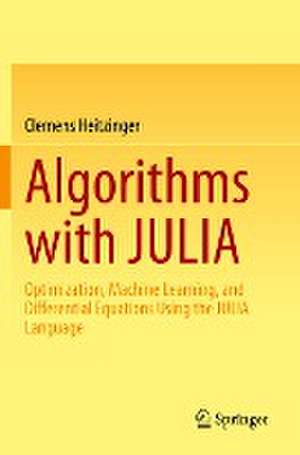Algorithms with JULIA: Optimization, Machine Learning, and Differential Equations Using the JULIA Language
Autor Clemens Heitzingeren Limba Engleză Paperback – 13 dec 2023
JULIA is a relatively new programming language which has been developed with scientific and technical computing in mind. Its syntax is similar to other languages in this area, but it has been designed to embrace modern programming concepts. It is open source, and it comes with a compiler and an easy-to-use package system.
Aimed at students ofapplied mathematics, computer science, engineering and bioinformatics, the book assumes only a basic knowledge of linear algebra and programming.
| Toate formatele și edițiile | Preț | Express |
|---|---|---|
| Paperback (1) | 376.06 lei 38-44 zile | |
| Springer International Publishing – 13 dec 2023 | 376.06 lei 38-44 zile | |
| Hardback (1) | 427.40 lei 38-44 zile | |
| Springer International Publishing – 13 dec 2022 | 427.40 lei 38-44 zile |
Preț: 376.06 lei
Nou
Puncte Express: 564
Preț estimativ în valută:
71.96€ • 75.48$ • 59.90£
71.96€ • 75.48$ • 59.90£
Carte tipărită la comandă
Livrare economică 28 martie-03 aprilie
Preluare comenzi: 021 569.72.76
Specificații
ISBN-13: 9783031165627
ISBN-10: 3031165624
Pagini: 439
Ilustrații: XXI, 439 p. 15 illus., 13 illus. in color.
Dimensiuni: 155 x 235 mm
Ediția:1st ed. 2022
Editura: Springer International Publishing
Colecția Springer
Locul publicării:Cham, Switzerland
ISBN-10: 3031165624
Pagini: 439
Ilustrații: XXI, 439 p. 15 illus., 13 illus. in color.
Dimensiuni: 155 x 235 mm
Ediția:1st ed. 2022
Editura: Springer International Publishing
Colecția Springer
Locul publicării:Cham, Switzerland
Cuprins
An Introduction to the Julia Language.- Functions.- Variables, Constants, Scopes, and Modules.- Built-in Data Structures.- User Defined Data Structures and the Type System.- Control Flow.- Macros.- Arrays and Linear Algebra.- Ordinary Differential Equations.- Partial-Differential Equations.- Global Optimization.- Local Optimization.- Neural Networks.- Bayesian Estimation.
Recenzii
“The author’s writing style is clear and concise, making the book easy to follow and understand. The book also includes useful code snippets and diagrams that help illustrate the concepts and algorithms discussed. … the book is well-written and an excellent resource for all those interested in learning the Julia language along with its applications. The extensive discussion of algorithms covering a variety of topics makes it a beneficial book for students, teachers, and researchers alike.” (Syed Inayatullah, zbMATH 1512.90003, 2023)
Notă biografică
Clemens Heitzinger is Associate Professor at the TU Vienna.
Textul de pe ultima copertă
This book provides an introduction to modern topics in scientific computing and machine learning, using JULIA to illustrate the efficient implementation of algorithms. In addition to covering fundamental topics, such as optimization and solving systems of equations, it adds to the usual canon of computational science by including more advanced topics of practical importance. In particular, there is a focus on partial differential equations and systems thereof, which form the basis of many engineering applications. Several chapters also include material on machine learning (artificial neural networks and Bayesian estimation).
JULIA is a relatively new programming language which has been developed with scientific and technical computing in mind. Its syntax is similar to other languages in this area, but it has been designed to embrace modern programming concepts. It is open source, and it comes with a compiler and an easy-to-use package system.
Aimed at students ofapplied mathematics, computer science, engineering and bioinformatics, the book assumes only a basic knowledge of linear algebra and programming.
JULIA is a relatively new programming language which has been developed with scientific and technical computing in mind. Its syntax is similar to other languages in this area, but it has been designed to embrace modern programming concepts. It is open source, and it comes with a compiler and an easy-to-use package system.
Aimed at students ofapplied mathematics, computer science, engineering and bioinformatics, the book assumes only a basic knowledge of linear algebra and programming.
Caracteristici
Written at an introductory level Using JULIA on a non-trivial application level Includes discussion of JULIA as an open-source alternative for MATLAB
